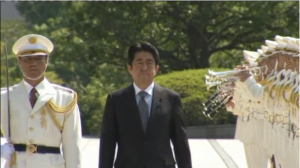
(Reuters) — Japanese Prime Minister Shinzo Abe on Thursday (July 16) pushed through legislation in the lower house of parliament that could see troops sent to fight abroad for the first time since World War Two, despite thousands of protesters overnight chanting and holding up placards reading “No War, No Killing” outside.
A lower house panel approval on Wednesday (July 15) of the unpopular bills, which would drop a ban on collective self-defence or fighting to defend a friendly country like the United States, sparked a huge demonstration and more are planned.
The protest was reminiscent of those that toppled Abe’s grandfather from the premiership 55 years ago after he rammed a revised U.S.-Japan security pact through parliament.
Crowds of protesters – organisers said 100,000 – gathered near parliament. Many stayed well into the night, chanting and holding up placards reading “Abe, quit”, “No War, No Killing” and “Scrap the War Bills”. A smaller number braved adverse weather to continue their protest on Thursday.
The bills will now go to the upper house, and if no vote is taken after 60 days they will be returned to the lower house, where Abe’s coalition can enact them with a two-thirds majority.
Abe says a bolder security stance, welcomed by ally Washington, is essential to meet new challenges, such as those from a rising China.
The changes expand the scope for Japan’s military to also provide logistics support to friendly countries, relax limits on peace-keeping operations and make it easier to respond to “grey zone” incidents falling short of war.
Opponents say the revisions could entangle Japan in U.S.-led conflicts around the globe and violate pacifist Article Nine of the U.S-drafted, post-war constitution.
Japanese navy and Philippines navy have conducted a joint drill over the disputed waters which are close to the Spratly Islands.
Philippine President Benigno Aquino and Japanese Prime Minister Shinzo Abe announced in Tokyo in early June that the two governments would start negotiations for the transfer of defence technology and equipment.
Tokyo has no territorial claims in the South China Sea, but it worries about becoming isolated should China dominate a waterway through which much of Japan’s ship-borne trade passes.
Prime Minister Shinzo Abe’s government has beefed up security cooperation across Southeast Asia this year.
China claims most of the South China Sea. The Philippines, Malaysia, Vietnam, Taiwan and Brunei have overlapping claims.
Beijing said in early June that some of its reclamation work in the Spratlys would be completed soon but that it would continue to build facilities on the reefs it occupies.
It says the outposts will have undefined military purposes as well as help with maritime search and rescue, disaster relief, environmental protection and navigation.







